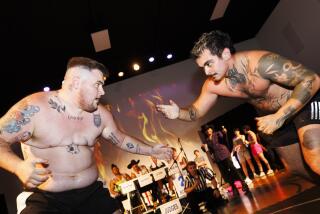A Winning Game
- Share via
For most of the 20,000 youngsters who will participate this year, Los Angeles’ Inner-City Games mean the chance to make new friends, win some scholarship money and compete for a gold medal.
But 20-year-old Guillermo Ulloa, a participant in the original event seven years ago who now volunteers as a supervisor, credits the games with giving him something more: a fresh start.
“I expect more from myself [now],” said Ulloa, 20, an East Los Angeles gang member whose life personifies the common tension between the lure of the street and the desire to reform. “I don’t want to gangbang all my life. I’m going back to school. I’m going to get a job.”
The games, which opened Wednesday at Universal Studios and will continue at a variety of sites in the city until late September, are held with youths like Ulloa in mind.
“The purpose of the games is to get kids motivated on sports, education and entrepreneurial skills, and keep them away from drugs and gangs,” said Jose Nati Correa, sports director of the games, which have attracted a number of corporate sponsors since they were founded by the Hollenbeck Youth Center in Boyle Heights in 1991.
*
At that first event, 13-year-old Ulloa played basketball for a team culled from the Ramona Gardens housing project in East Los Angeles, where he still lives.
Competing did not discourage him from later joining the local gang, Big Hazard.
“When I was young I liked it. [Gang members] knew how to make money. They went places--to the mountains, to concerts.”
Ulloa said he soon got into trouble. Five high schools expelled him for fighting before he dropped out at 18. Thrown from one school to another, he never progressed beyond 12th grade.
At 16, he was convicted of stealing a Honda Accord and served a month in Juvenile Hall. Two probation violations during the next two years landed him in detention for a month for each offense, he said.
“It doesn’t change you,” he said. “When you go to jail, it makes you stronger.”
But the Inner-City Games helped transform what jail could not, he said.
Playing basketball at the Hollenbeck center, where practices were held, gave Ulloa time away from the gang to think about the mistakes he was making, he says.
At Hollenbeck and in Ramona Gardens, he began coaching younger basketball players. Soon, he was talking to them about avoiding trouble while growing up--putting his own life in a new perspective.
“The kids remind me a lot of me. They’re troublemakers. They like to steal,” he said. “That was the way I was. I grew up stealing.”
Youth center workers who helped organize the Inner-City Games encouraged Ulloa to go back to school and find a job.
In January, he enrolled in a forklift truck driving class at East Los Angeles Skill Center, and he is scheduled to graduate next year.
In the meantime, he has applied for jobs at Home Depot and the U.S. Forest Service, where he worked for six months last year as an emergency firefighter.
Friends and mentors say they have also noticed him mature.
*
“His frame of thinking has changed,” said Danny Gullart, 42, a former gang member and convict who advises youngsters on the dangers of gangs and drugs at Ulloa’s housing project. “The Inner-City Games has done quite a bit for motivating him every year.”
In recent years, stories like Ulloa’s have helped attract enough sponsorship and donations to expand the games, which have added essay and art competitions to the sports events.
Six- to 18-year-olds from disadvantaged areas ranging from the San Fernando Valley to Santa Ana now take part.
Other cities have copied the idea. San Diego, San Jose, Atlanta, Orlando, Chicago, New York, Las Vegas, Miami and San Antonio now hold their own annual games.
Ulloa, meanwhile, says he is still trying to reform. He has not rejected all aspects of gang life, though he has finished with gang violence, he says.
*
The four-inch letters “B” and “H” tattooed on Ulloa’s left and right shoulders permanently mark his continued allegiance to Big Hazard. But he insists there is a difference between kicking back with friends in the gang and stealing cars or fighting.
During Wednesday’s opening ceremony, he shepherded six Ramona Gardens teenagers around the hot dog and soda booths.
“Me taking care of kids makes me think, gives me a sense of responsibility,” he said.
More to Read
Sign up for Essential California
The most important California stories and recommendations in your inbox every morning.
You may occasionally receive promotional content from the Los Angeles Times.











